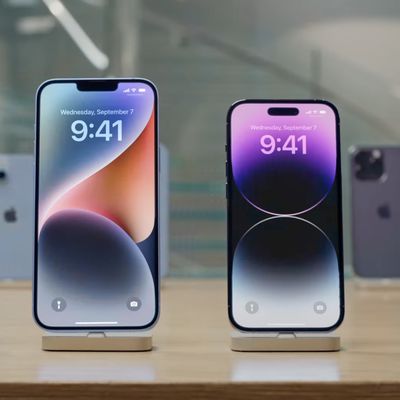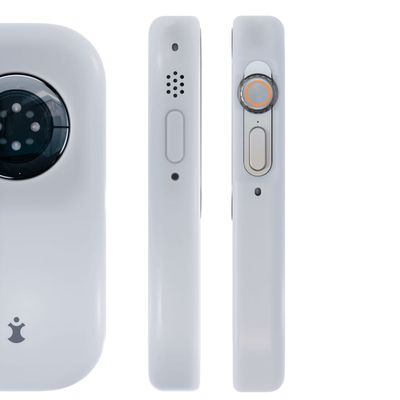Apple Working With Stanford to Determine If Apple Watch Can Detect Abnormal Heart Rhythms
Apple is planning to work with Stanford and telemedicine vendor American Well to determine whether the heart rate sensor in the Apple Watch can be used to detect abnormal heart rhythms and common heart conditions, reports CNBC.
An Apple Watch, if able to accurately detect arrhythmias, or abnormal heart patterns, could identify patients that are at a high risk of atrial fibrillation or similar conditions. Heart arrhythmias aren't always symptoms of a serious disease, but Apple Watch owners could find out about a problem from the Apple Watch and then get it checked out at a doctor if the device is determined to accurately predict heart problems.

"Atrial fibrillation is a common rhythm disorder and knowing someone has it is medically useful because those people might need specific treatments," said Bob Wachter, chair of the Department of Medicine at the University of California San Francisco.
A study conducted by the University of California, San Francisco and the team behind the Cardiogram app previously determined that the Apple Watch was able to detect abnormal heart rhythms with 97 percent accuracy. Apple could get even better results as it has access to raw data.
Just today, Apple CEO Tim Cook talked about Apple's health interests in an interview with Fortune. He said Apple is "extremely interested" in health, and that it represents a major business opportunity.
If you look at it, medical health activity is the largest or second-largest component of the economy, depending on which country in the world you're dealing with. And it hasn't been constructed in a way where the focus at the device level is making great products from a pure point of view. The focus has been on making products that can get reimbursed through the insurance companies, through Medicare, or through Medicaid. And so in some ways we bring a totally fresh view into this and say, 'Forget all of that. What will help people?'
Cook also said that Apple has been surprised to learn how the heart rate monitoring in the Apple Watch has already been helping people. Many people collect data with the Apple Watch, notice something amiss, and then go to the doctor to get it checked out. "A not-insignificant number have found out if they hadn't come into the doctor they would have died," said Cook.
Apple's study in partnership with American Well and Stanford is set to begin later this year, according to CNBC's sources.
Popular Stories
Apple will adopt the same rear chassis manufacturing process for the iPhone SE 4 that it is using for the upcoming standard iPhone 16, claims a new rumor coming out of China. According to the Weibo-based leaker "Fixed Focus Digital," the backplate manufacturing process for the iPhone SE 4 is "exactly the same" as the standard model in Apple's upcoming iPhone 16 lineup, which is expected to...
Apple typically releases its new iPhone series around mid-September, which means we are about two months out from the launch of the iPhone 16. Like the iPhone 15 series, this year's lineup is expected to stick with four models – iPhone 16, iPhone 16 Plus, iPhone 16 Pro, and iPhone 16 Pro Max – although there are plenty of design differences and new features to take into account. To bring ...
A widespread system failure is currently affecting numerous Windows devices globally, causing critical boot failures across various industries, including banks, rail networks, airlines, retailers, broadcasters, healthcare, and many more sectors. The issue, manifesting as a Blue Screen of Death (BSOD), is preventing computers from starting up properly and forcing them into continuous recovery...
Israel-based mobile forensics company Cellebrite is unable to unlock iPhones running iOS 17.4 or later, according to leaked documents verified by 404 Media. The documents provide a rare glimpse into the capabilities of the company's mobile forensics tools and highlight the ongoing security improvements in Apple's latest devices. The leaked "Cellebrite iOS Support Matrix" obtained by 404 Media...
Apple is seemingly planning a rework of the Apple Watch lineup for 2024, according to a range of reports from over the past year. Here's everything we know so far. Apple is expected to continue to offer three different Apple Watch models in five casing sizes, but the various display sizes will allegedly grow by up to 12% and the casings will get taller. Based on all of the latest rumors,...
If you have an old Apple Watch and you're not sure what to do with it, a new product called TinyPod might be the answer. Priced at $79, the TinyPod is a silicone case with a built-in scroll wheel that houses the Apple Watch chassis. When an Apple Watch is placed inside the TinyPod, the click wheel on the case is able to be used to scroll through the Apple Watch interface. The feature works...









 ('https://www.macrumors.com/2017/09/11/apple-watch-stanford-abnormal-heart-rhythms/')
('https://www.macrumors.com/2017/09/11/apple-watch-stanford-abnormal-heart-rhythms/')












